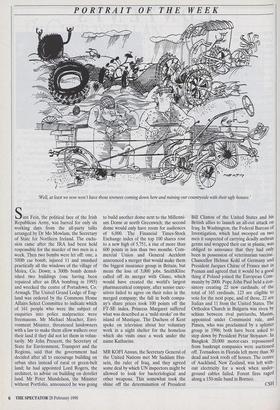PORTRAIT OF THE WEEK
`Well, at least we now won't have those townees coming down here and ruining our countryside with their ugly houses.'
Sinn Fein, the political face of the Irish Republican Army, was barred for only six working days from the all-party talks arranged by Dr Mo Mowlam, the Secretary of State for Northern Ireland. The exclu- sion came after the IRA had been held responsible for the murder of two men in a week. Then two bombs were let off: one, a 5001b car bomb, injured 11 and smashed practically all the windows of the village of Moira, Co. Down; a 300lb bomb demol- ished two buildings (one having been repaired after an IRA bombing in 1993) and wrecked the centre of Portadown, Co. Armagh. The United Grand Lodge of Eng- land was ordered by the Commons Home Affairs Select Committee to indicate which of 161 people who were the subject of enquiries into police malpractice were freemasons. Mr Michael Meacher, Envi- ronment Minister, threatened landowners with a law to make them allow walkers over their land if they did not let them in volun- tarily. Mr John Prescott, the Secretary of State for Environment, Transport and the Regions, said that the government had decided after all to encourage building on urban sites instead of rural or green-belt land; he had appointed Lord Rogers, the architect, to advise on building on derelict land. Mr Peter Mandelson, the Minister without Portfolio, announced he was going to build another dome next to the Millenni- um Dome at north Greenwich; the second dome would only have room for audiences of 6,000. The Financial Times-Stock Exchange index of the top 100 shares rose to a new high of 5,751, a rise of more than 600 points in less than two months. Com- mercial Union and General Accident announced a merger that would make them the biggest insurance group in Britain, but mean the loss of 3,000 jobs. SmithKline called off its merger with Glaxo, which would have created the world's largest pharmaceutical company, after senior exec- utives failed to agree on their roles in the merged company; the fall in both compa- ny's share prices took 100 points off the FT-SE index. Princess Margaret suffered what was described as a 'mild stroke' on the island of Mustique. The Duchess of Kent spoke on television about her voluntary work in a night shelter for the homeless which she visits once a week under the name Katharine.
MR KOFI Annan, the Secretary General of the United Nations met Mr Saddam Hus- sein, the ruler of Iraq, and they agreed some deal by which UN inspectors might be allowed to look for bacteriological and other weapons. This somewhat took the shine off the determination of President Bill Clinton of the United States and his British allies to launch an all-out attack on Iraq. In Washington, the Federal Bureau of Investigation, which had swooped on two men it suspected of carrying deadly anthrax germs and wrapped their car in plastic, was obliged to announce that they had only been in possession of veterinarian vaccine. Chancellor Helmut Kohl of Germany and President Jacques Chirac of France met in Poznan and agreed that it would be a good thing if Poland joined the European Com- munity by 2000. Pope John Paul held a con- sistory creating 22 new cardinals; of the total of 165 cardinals, 123 are eligible to vote for the next pope, and of these, 22 are Italian and 11 from the United States, The Orthodox Church in Bulgaria was riven by schism between rival patriarchs, Maxim, appointed under Communist rule, and Pimen, who was proclaimed by a splinter group in 1996; both have been asked to step down by President Petar Stoyanov. In Bangkok 20,000 motor-cars repossessed from bankrupt companies were auctioned off. Tornadoes in Florida left more than 30 dead and took roofs off houses. The centre of Auckland, New Zealand, was left with- out electricity for a week when under- ground cables failed. Forest fires raged along a 150-mile band in Borneo. CSH


























































 Previous page
Previous page